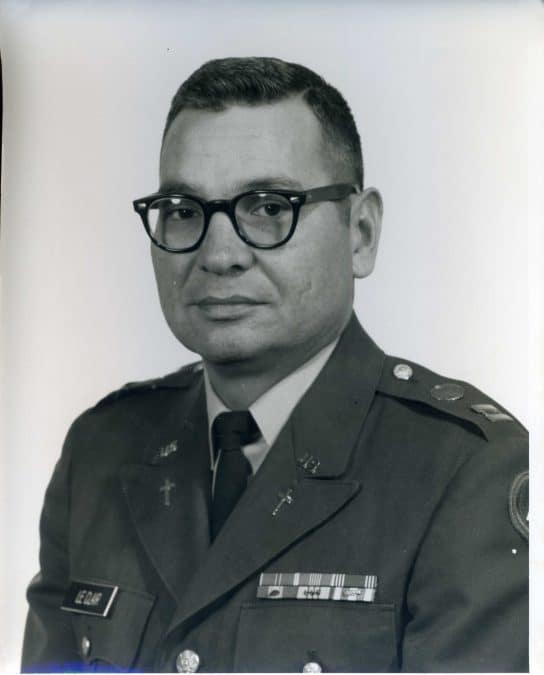The Citizen Potawatomi Nation Cultural Heritage Center honors servicemen and women by featuring photos on the Veterans’ Wall of Honor, highlighting efforts during wartime in exhibits and an interactive database. This Veterans Day, we recognize Charles LeClair, the first Native American Southern Baptist chaplain of the U.S. Army.
LeClair is a descendant of the Kaw Nation and Ponca Tribe of Oklahoma and a member of the Citizen Potawatomi Nation. He grew up near Ponca City, Oklahoma, on an 80-acre allotment members of his family who are enrolled in the Ponca Tribe received. After elementary school, he attended Chilocco Indian School in Newkirk, Oklahoma, graduating in 1948 with an emphasis on blacksmithing.

He expanded his education with degrees from Northern Oklahoma Junior College in Tonkawa, Oklahoma, Oklahoma Baptist University in Shawnee, Oklahoma, and Southwestern Baptist Theological Seminary in Fort Worth, Texas. LeClair’s vast skillset includes trombone, boxing, welding, ministering and more.
His military service in both the Army and Air Force took him to Georgia, Alaska, Fort Sill, New York and Vietnam. After retiring from the military, LeClair spent the next 23 years a civil servant.
Faith and military service
As a sergeant in the Air Force, he became an ordained Baptist minister while serving in Alaska and founded a church in Palmer. He also pastored at a church while attending Oklahoma Baptist University in Shawnee. He then graduated with a bachelor’s of divinity from Southwestern Baptist Theological Seminary in 1962 — all of which led him to become a chaplain in the Army.
After founding and ministering at several churches in Oklahoma and Kansas, LeClair felt called back to the military. He became the first Native American Southern Baptist chaplain in the Army and attended Fort Hamilton chaplain school in New York.
While stationed at Fort Sill following Fort Hamilton, he established a chapel at aviation command. LeClair became the First Field Artillery Brigade Chaplain and held many military funerals — once for a Chilocco classmate who visited LeClair the evening before deploying to Vietnam.
During an interview with the Oklahoma City Times in November 1969, LeClair said, “What I like most is that in the Army, the chaplain is considered part of the team, and is able to mingle with the people in duty situations. You have more exposure to people who are in your charge.”
LeClair was stationed in South Vietnam in spring 1967 on active duty and was quickly promoted to captain and chaplain of the 46th Engineer Battalion. Ten months into service, a vehicle accident left him with limited mobility for his last two months overseas. However, LeClair finished his tour.
He spent the next two years undergoing spinal fusion treatments at Walter Reed Army Medical Center in Washington D.C., while assigned to Fort Jackson, South Carolina. LeClair still served as Fort Jackson Hospital chaplain while he overcame his injuries.
LeClair honorably retired in April 1972, five years after beginning his service in Vietnam.
LeClair received numerous awards and accolades, including the Army Bronze Star, Commendation Medal, Vietnam Service Medal with four bronze service stars and a Republic of Vietnam Campaign Ribbon, just to name a few.
After active duty
His career following military service included working as a member of the Economic Stabilization Program of the 1970s, the U.S. Department of Labor’s Office of Federal Contract Compliance, and the Equal Employment Opportunity Manager for Lockheed Space Operations — now Lockheed Martin — until he retired in 1991.
He became a member of the Chilocco Indian School Hall of Fame in June 2003.
If you are a veteran and a member of the Citizen Potawatomi Nation and would like your place on the Veterans Wall of Honor at the CPN Cultural Heritage Center, please call 405-878-5830 and ask for KeAnne Langford or Blake Norton or email keanne.langford@potawatomi.org or bnorton@potawatomi.org.
